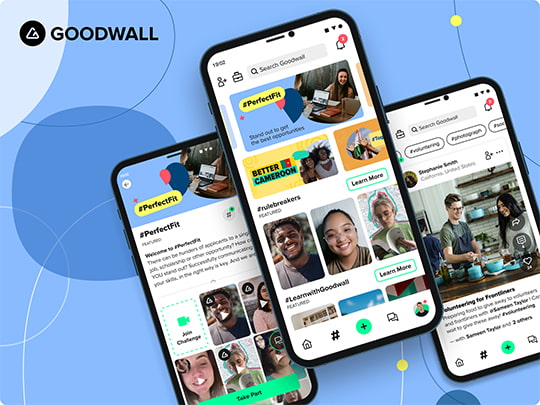Getting a new job normally requires you to fill out an application on the job website, send a comprehensive resume, and create a personalized cover letter.
After taking the time to submit everything, it can still take up to a month to hear back from someone, if you ever do.
But what if there is a better way to apply for the job you want, even if it’s not listed on their career page?
Cold emailing for a job is one-way candidates can stand out, show interest, and make a personal connection with current team members.
But how do you write a cold email for a job?
It’s actually very simple and straightforward. Follow these steps to write a cold email that will help you land the job you want!

Want to showcase yourself in the best way possible to future employers and hiring managers?
Sign up to Goodwall!
- Develop skills & experience
- Highlight accomplishments
- Network globally
- Find top jobs & internships
Download the app now to get started for FREE!
What Is a Cold Email?
A cold email is an introductory email you send to people you don’t have a former relationship with. Cold emails are often used at companies looking to generate sales and leads from prospective customers. However, cold emails can also be used for a variety of other reasons, including, in our case, for job hunting.
Cold emails are a great way to virtually network with people and build connections. You could send a cold email when applying for internships, applying to colleges, or to make new professional connections. The few minutes you spend writing a cold email can generate long-lasting connections, new career opportunities, informational interviews, and much more.
Cold Email vs Cold Calling
Should you spend your time cold emailing someone or cold calling? Cold calling may seem more personal, but, in fact, cold calls can actually come off as more intrusive.
Here are a few reasons why you should send a cold email over cold calling.
- Respecting Someone’s Time. You can never know the most appropriate time to call someone you’ve never spoken to before. An interruption from someone you don’t know can be jarring on a busy day. Cold emails, however, will be waiting for them in their inbox when they are ready to read them.
- Better Odds. If you call someone out of the blue and they can’t speak at the moment, they may never call you back. A cold email, however, gives the recipient ample time to reply in their own time, prompting a longer conversation.
- Getting Your Point Across. An email is something you can erase and edit in real-time before sending. Writing something down in your own time gives you the opportunity to say everything you need to say in the right way.
- Record Keeping. Having everything in writing allows you go to back easily to see what was said. A phone call makes it harder to remember everything you may need to refer back to. Having a record of your email correspondence will help you send better follow-ups and keep everything together in one place.
Related Read: When is the Best Time of Day or Time of Year to Apply for Jobs?
How to Cold Email for a Job
Cold emailing for a job shows that you’re willing to take the initiative and extra effort required to reach your next career goal. This type of ambition and drive will impress many of the people you end up reaching. But how do you get started on a cold email for a job?
1. Research
The first thing you need to do before sending a cold email is to research the person you are sending it to. Personalization is key when it comes to sending cold job emails. You want to make sure you know who your recipient is and their job title.
Be sure this person is related to the job you’re applying for. Make it known that you’ve emailed them specifically because of their skillset. People are generally more motivated to help others when they feel uniquely qualified to do so.
Do whatever you can to avoid sending a generic email to an info@ email address. To do this, start by looking at the company directory. You can also try looking up the company on LinkedIn. Both their website and LinkedIn pages should have job titles and contact information to go off of. If all else fails, it’s okay to call the company and ask!
2. Write a Compelling Subject Line
Most senior-level employees have a full inbox at all times. You’ll need to write a relevant, strong, and eye-catching subject line to get their attention. In fact, 35% of email recipients open emails based on the subject line alone.
Give the recipient a strong reason to actually open and read your email. Once you know what the company wants and what you hope to gain from this email, build your subject line off of that. For example, if you’re applying to the marketing team a subject line could read, “Marketing Manager with ____ Expertise Ready to Build Your Team.”
Make it short and creative and give practical information. If you can, try personalizing the subject line with a common connection or a compliment about the department or company. Think about what subject lines you’re more prone to opening and try to mimic that.
Related Read: 5 Jobs That Allow You to Make Money as You Travel the World
3. Start With a Powerful Opening Paragraph
First, you must choose the right salutation. Avoid robotic phrases like, “To Whom It May Concern.” You want to keep this personal!
Use Ms./Mr. and their “last name” to address them. If you’re unsure of your recipient’s pronouns, you can use Mx. If for some reason you cannot find an exact name, list the department instead.
The first paragraph should be an introduction to who you are and why you’re emailing in the first place. Include a little background information about your career and what interests you in this role. Include why you decided to email this particular person. Keep this portion of the email short but informative.
4. State Your Reasonable Request
The next paragraph should be an actionable, yet reasonable request for your recipient. Don’t outwardly ask them for a job. Instead, offer some options to get more information about the company.
Here is where you can suggest a phone call or virtual coffee date in order to learn more about the company. You can ask for more information about the recipient’s role in the organization or what qualities they’re looking for on their team. You can also get advice on how to succeed in a specific career.
Keep it simple and don’t overload them with requests. Think about what you would like to gain from writing this email. Giving them a call-to-action makes it more likely you’ll get a response and an actual meeting, potentially leading to a job discussion.
Related Read: 15 Best Certifications for Jobs to Set You Apart From Other Candidates
5. End With a Solid Closing Paragraph
End your email by giving them your contact information. If you’re scheduling a video chat or phone call, give them some dates and times to choose from so they can see what works for their schedule.
Don’t forget to thank them for their time and consideration. Remember, they don’t know who you are, so be sure to remain professional and appreciative.
Keep your email signature professional and avoid any emojis or GIFS. Use the same font style and color throughout the email and avoid any bolds, underlines, or italics. Simplicity is key! Don’t take away from the message by adding in unnecessary formatting.
6. Proofread and Proofread Again
Be sure to read your email out loud a couple of times before sending it out. If you can, it also helps to have someone else read your writing. It’s easy to miss something when you’ve been looking at it over and over for an extended period of time.
You’re the one looking to land a job at this company so you have to be sure your email has a nice flow, is easy to read, and has no spelling errors.
7. Learn to Deal With Follow-Ups and Possible Rejections
You’ve found the right person to email, used the right cold email template, and still haven’t heard back. That’s okay! Follow-up emails are perfectly normal and acceptable, especially when it comes to writing a cold email.
If you haven’t heard back after a week or longer, send a friendly follow-up that includes the same information in the first email, but also acknowledges that you’ve emailed them before. You can send up to 2-3 emails before moving on to another team member, or another company.
With any cold email, there is a possibility of never hearing back from the person you emailed. Not getting a response could be due to a number of reasons, so don’t take it personally! Instead, use this as a learning curve.
You could try using a different subject line to see if that makes a difference. Maybe you need to shorten your email to make it more digestible for your recipient. You could also try using a cold email template for a job inquiry. There are many templates out there for you to choose from!
Just because you didn’t hear back from one person doesn’t mean you should stop sending cold emails to build other connections!
Related Read: Is Energy a Good Career Path? (Renewable Energy Jobs & Traditional)
Writing a Cold Email for a Job
Writing a cold email for a job can be overwhelming, but it’s also exciting! It’s a great way to put yourself at the top of the resume pile by showing ambition and initiative in your career goals.
Even if you don’t land the job, a cold email can help you gain connections that you normally never would.
For more information on how to write a cold email for a job, career tips and education advice, or simply how to reach your full potential, head back over to our blog to check out more great articles. Thanks for reading!



